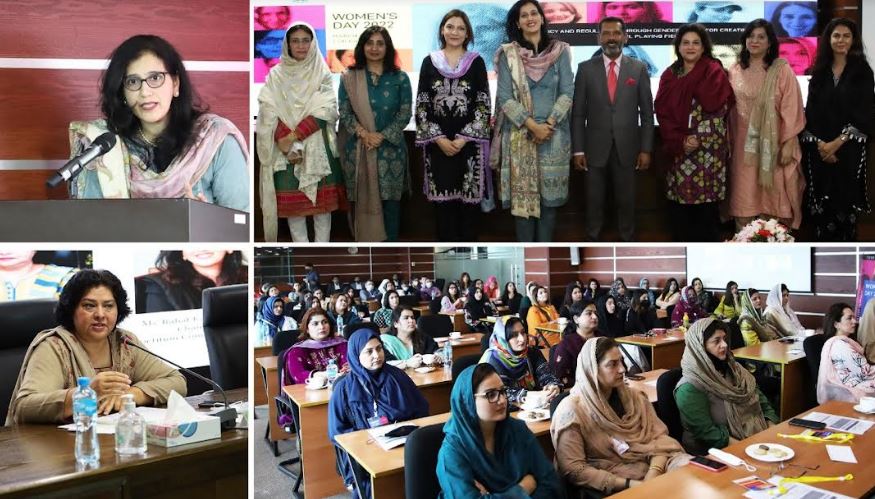ISLAMABAD, MAR 8 /DNA/ – The Competition Commission of Pakistan (CCP) marked International Women’s Day by holding a seminar on “Policy and Regulation through Gender Lens – for Creating a Level Playing Field” discussing the importance of policy and regulation in the context of gender issues and to deliberate ways and means to bridge the existing gaps. Over a hundred female participants from different regulatory bodies including SBP, FBR, SECP, NEPRA, OGRA, PTA, PEC, PEPRA attended the seminar.
Along with CCP team Ms. Rahat Kaunain Hassan, Chairperson, Ms. Shaista Bano, Member, Ms. Bushra Naz Malik, Member, the other speakers/panelists included Ms. Shahera Shahid, Secretary Ministry of Information and Broadcasting (MoIB) & Member PEMRA, Ms. Sima Kamil, Deputy Governor SBP, Ms. Ambreen Iftikhar, Member FBR, Ms. Sadia Khan, Commissioner SECP, Ms. Jahanara Sajjad, Ex-member Audit Oversight Board, Ms. Nighat Amir, Director General Ministry of Information and Broadcasting, and Ms. Mussarat Jabeen, Executive Director SECP.
In her opening remarks, the Chairperson stated that the objective of selecting the topic ‘Policy & Regulation – through a gender lens’ is to recognize share and pursue the seriousness of purpose that is entrusted to the regulators in their respective domains. While policy making is not our domain yet by virtue of our regulatory role we can act as a catalyst in helping Government to make it effective.
She added that for ensuring and enhancing economic participation of women on a level playing field, prioritized policy areas with the gender focus may include, education, health, trade & labour policy, SMEs, and promoting women in leadership roles. She stated that such prioritisation resonates with the gender gap index established by the World Economic Forum which includes as its subindexes: 1) Educational Attainment, 2) Health and Survival, 3) Economic Participation & Opportunity and Political Empowerment. To this end, she emphasized need for gender-disaggregated data and documentation for informed policy making.
She also proposed that the National Commission on Status of Women may consider building a sectoral data bank of all working/professional women, be that women in regulation, law, accountancy, engineering, media, judiciary, IT, medicine, art, architecture or any other field; to break the myth that there are not many qualified women.
Addressing the panel on “Government Policies and Initiatives towards Gender Equality”, Ms. Shahera Shahid, Secretary, Ministry of Information and Broadcasting (MoIB) said that despite the social and economic difficulties, women are excelling in every field with honesty and dignity, where the number of women in key leadership positions in Pakistan has gradually increased. Addressing the same panel, Ms. Ambreen Iftikhar said that women empowerment can be achieved through their participation in the formal economy. She said that women are more ethical and more committed, and we just need to facilitate and inform them.
The second panel discussion was on “At the Regulator Level – Adopt Board Reform Programs with Clear objectives and implementation Framework to Ensure Gender Equality.” Addressing on the occasion, Ms. Sadia Khan said that the SECP has taken various initiatives to promote gender diversity at the workplace by issuing circulars to various sectors to develop gender diversity policy at board levels. Addressing the second panel, Ms. Bushra Naz Malik said that women in a leadership role in the public sector can help bridge gender disparity gap. Ms. Jahanara Sajjad, Ex Member Audit Oversight Board emphasised better female membership on public and private organisation boards.
Ms. Sima Kamil, Deputy Governor of State Bank of Pakistan (SBP), highlighted the ‘Banking on Equality’ policy, which focuses on increasing the number of women in the banking workforce, moving from gender-neutral to gender intentional policies, ensuring women’s champions at all access points, and overcoming women related data challenges.
The panel discussion on “Improving Advocacy by ensuring Transparency and Non-discrimination in the Organization Processes”, was addressed by Ms. Shaista Bano, Member CCP, who said that the importance of effective advocacy cannot be denied advocating for gender equality. Mussarat Jabeen, said that we need to develop a gender-responsive recruitment policies in organisations. Ms. Nighat Amir said that her ministry has more gender diversity and more women on a leadership role in different departments, which is playing a very productive role in their capacities.

















